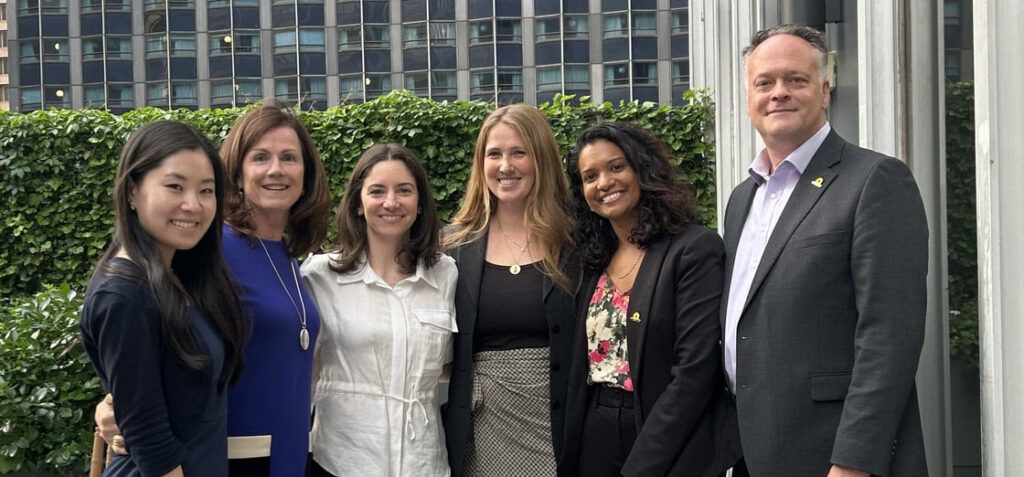Recapping the 2025 One Mind at Work Legal Summit: A Bold Step Toward Disrupting Mental Health Norms in Law

On June 3-4, in a compelling two-day gathering in New York City, One Mind at Work held its 3rd Annual One Mind at Work Legal Summit, hosted by O’Melveny & Myers. Sponsored by O’Melveny & Myers, Otsuka, Akin and BakerHostetler, the summit brought together leading voices across the legal profession to challenge longstanding norms and reimagine how the industry addresses mental health and well-being. Under the theme “Reframing Well-being as a Disruptor,” this year’s Legal Summit was a call to disrupt the status quo in the legal industry. It was an invitation for the profession to no longer accept the culture of overwork, which can lead to burnout and ill health.
Challenging the Status Quo in Legal Culture: Leadership Speaks Out
Culture change in the legal field must be proactive, not reactive. Leaders called for bold changes to legacy practices that normalize burnout and reward overwork. Speakers like Andy Fleischman, Partner and General Counsel at FTV Capital, and Pam Miller, Co-Head of Litigation at O’Melveny & Myers, highlighted the emotional toll legal work can take—especially when leadership fails to prioritize mental wellness.
“Mental health is a universal issue and particularly acute in the legal industry,” Fleischman stated.
Miller added, “We’re forgetting about the wellness of our partners. If we want our organizations to truly transform, we must address the wellness of our leaders and partners.”
“Work is central to how we define purpose and meaning in life. Who we work with and how they treat us really matters,” said Dr. Kathy Pike, CEO of One Mind. “The most expensive strategy is to not pay attention to people’s mental health.”
Leadership Matters: Modeling and Accountability at the Top
A comprehensive approach to organizational well-being includes partners and senior leaders – not just junior associates and counsel. The research is clear that a leader’s well-being directly affects the well-being of those who work with them and for them. Encouraging accountability in performance reviews and management practices is key. Organizations invested in well-being and culture change ensure that leaders and managers are accountable for supporting the well-being of their teams and it is included in their performance reviews.
“Leadership support for mental health is too often stuck at the C-suite level. We need managers equipped to drive meaningful change day-to-day,” said Dr. David Ballard, VP of One Mind at Work.
“We must redefine the challenge we face. Despite the rapid advancement of artificial intelligence, our legal industry will continue depending upon the collaborative, intelligent and passionate professionals who will continue confronting client demands, workforce changes, and evolving societal and governmental expectations,” said Timothy E. Sander, Executive Vice President & Chief Ethics and Compliance Officer, Sumitomo Corporation of Americas. “As leaders, we must do more than provide adequate resources to address the debilitating impact of the most urgent mental health challenges experienced by those among us. We must also promote the mental health conditions, practices and behaviors that strengthen and enhance our intellectual capacity and emotional agility so we can fulfill our professional responsibilities that also help sustain our justice system.”
From Individual to System: Embedding Mental Health in Organizational Strategy
The Legal Summit shared bold strategies for how to move forward organization by organization, and as a group of leaders who care about the future of well-being in law. Presentations emphasized a shift away from individual responsibility to systemic design. Evidence-based measurement frameworks, such as One Mind at Work’s Mental Health at Work Index, are critical tools to support the evolution from surface-level response to data-driven strategies. One Mind at Work’s 3 Ps Framework and the NeuroLeadership Institute’s Systems Change Model were also introduced as vital frameworks to measure and drive organizational change.
Dr. David Rock, CEO of the NeuroLeadership Institute, added, “If the legal profession wants to move forward, we need to shift from depleting systems to regenerative ones that give more than they take.”
“We need to move past this false dichotomy that wellbeing means sacrificing hard work, excellent client service, and profit,” shared Allison Friend, Managing Director for Talent Development at O’Melveny & Myers. “Healthy lawyers deliver more success to our clients, are better mentors to junior associates, and our colleagues, and our organizations. We all know this is true. So how can we reframe wellbeing as something that helps us achieve great things and core to the way we do our work?”
Next Steps for the Legal Community
As momentum continues to build across the legal community, One Mind at Work plans to continue developing a legal industry-specific benchmark for the Mental Health at Work Index.
If you’re not yet a member of One Mind at Work, please consider joining. We can have the greatest impact with a coalition committed to real change. Reach out to membership@onemind.org to learn more.
To establish a baseline for your organization’s mental health efforts and learn from peers in the legal industry and beyond, law firms and One Mind at Work members are highly encouraged to complete the self-assessment. Membership is not required to take the assessment.
“We’re excited to welcome new firms to this collaborative effort and build on the momentum from our time together to co-create a future for the legal industry that’s characterized by both well-being and long-term success,” said Dr. David Ballard, Vice President of One Mind at Work.
Together, we’re driving a future where well-being and high performance go hand in hand. To learn more or join our mission, visit onemindatwork.org or contact membership@onemind.org.
